Keeping safe in the sun!
This week, we’ve been making the most of the lovely warmer weather! The sunshine sparked some great conversations about how to look after ourselves and the environment when it’s hot outside.
We talked about the importance of wearing sun cream and a sun hat, staying hydrated by drinking plenty of water and finding shade when we need a break from the sun.
We also noticed our sunflowers and spider plants were looking a little thirsty—since there hasn’t been much rain lately—so we made sure to give them a good water!




Year One Forest School Fun!
This term, Year One have begun Forest School and are loving their outdoor adventures! They’ve been learning about May Day traditions and created mini maypoles for an imaginary fairy garden.




In science, they’re exploring how flowers and trees are similar and different. Next week, they’ll be learning about deciduous trees (which lose their leaves in autumn) and evergreen trees (which keep their leaves all year) – which will be reflected in their forest school learning!
Help at home:
– Go on a walk and spot trees – are they deciduous or evergreen?
– Collect leaves or flowers to compare at home.
– Talk about changes trees go through across the seasons.
A visit from Leeds Rhinos!
St James had a very exciting visitor from the Leeds Rhinos in today during our Collective Worship. Ian came in to talk to the children about teamwork and inclusivity – two key skills that help us to be happy and healthy in our school. We got the opportunity to learn about the different teams that Leeds Rhinos have, such as: men’s and women’s rugby; netball; a wheelchair rugby team and many more. The children responded really well when discussing the importance of inclusivity, teamwork and stereotyping, particularly in sport.
Ian also reminded us of the fantastic offer from Leeds Rhinos for pupils to go and see one of their matches! If you/your child is interested in this, discounted tickets can be purchased through school. Here are the details of the match:
Leeds Rhinos vs Hull FC
Friday 16th May
Kick off: 20:00
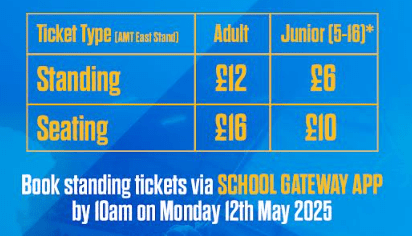
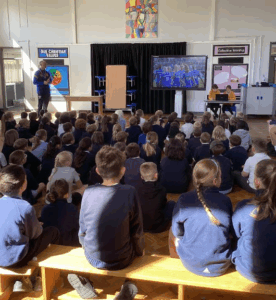
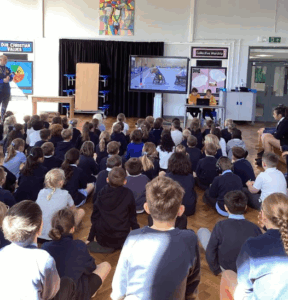
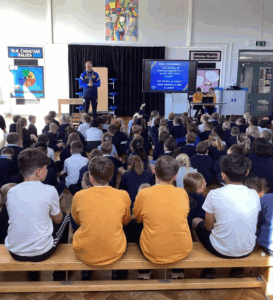
Trees and Spirituality in Year 1
Daily Poem
This week, we’ve enjoyed reading our daily poem I swept the dog by Ken Nesbitt.

Each week, we have a new poem that we read together each day. Reading poetry is a wonderful activity that offers a ton of benefits—both educational and emotional, such as:
- language development
- listening and comprehension skills
- imagination and creativity
- emotional expression
- bonding time
- cultural awareness and empathy.
Help at home: Take some time to enjoy our weekly poem together as part of your child’s homework routine. Do you have any favorite poems you love reading at home? We’d love to hear them—feel free to bring them in and share with the class!
History Topic – Heroes
We’ve begun our exciting new History topic: Heroes. Over the next five weeks, we’ll be learning about two inspirational figures: Nelson Mandela and Leonora Cohen.

To kick things off, we explored the big question:
What is a hero?
Here are some of the lovely ideas the children shared:
“Somebody who’s done something very good.”
“Somebody who helps or saves people.”
“Someone who protects you from danger.”
We also discussed the qualities of a hero and how these connect to our school rules and Christian values. These included:
empathy, passion, caring, kindness, honesty, bravery, respect, helpfulness
Over the next few weeks, we’ll be using and exploring this vocabulary in class.
Help at home: Look at the key vocabulary together to support your child’s understanding.
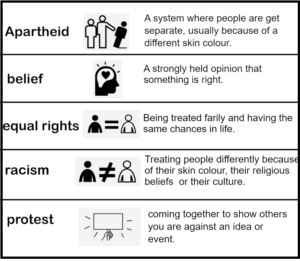
Welcome back!
We hope you all had a wonderful Easter break. The children have returned full of energy and enthusiasm and they’ve made a fantastic start to the summer term!
Phonics
We’ve now learnt all of the Phase 5 sounds, so we’ll be revisiting them to prepare for the upcoming Phonics Screening Check in early June. We’ll be practising reading both real and ‘alien’ (nonsense) words to build confidence and fluency. To help us, we always use our decoding mantra:

Maths
In Maths, we’re continuing to work on counting forwards and backwards to 50. We’re using number lines and a 50 grid to help us find:
-
1 more and 1 less
-
10 more and 10 less
These are key skills that help build number sense and mental maths fluency.
Help at home:
Phonics: play phonics games and practise reading real and alien words together.
Maths: Use the 50 grid to practise counting forwards and backwards. Try finding 1 more/less or 10 more/less from different numbers.
Planting Sunflowers and Writing a Recount
This week, Year One completed an amazing independent write all about their science learning! The children wrote a recount about planting their very own sunflower seeds and showed off what they’ve learned about the life cycle of a plant. They carefully planted their seeds and made thoughtful predictions about how much they would grow over the Easter break. They also explored what plants need to grow healthy and strong – like sunlight, water, and care.
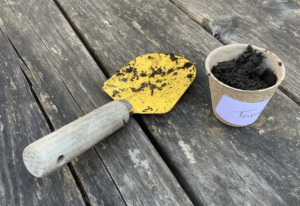



We are so impressed with how fantastic their writing has become. The children are becoming much more independent and confident, especially when using verbs and adjectives to make their writing exciting and detailed.

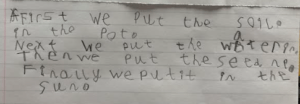

I’m looking forward to investigating how much our sunflower seeds have grown over the Easter break and comparing this to our predictions!
What a fantastic end to the Spring term – thank you Year One!
Help at home idea: Encourage your child to keep a plant diary or describe what they see in the garden using adjectives and verbs!
Grammar in Year One – Verbs and Tenses
This week, Year One has been learning about verbs and how they change with tense. We found out that adding ‘-ed’ turns some verbs into the past tense. We talked about how not all verbs follow this rule and had fun exploring tricky examples.


We have also been spotting verbs in sentences from our current class novel, How to Wash a Woolly Mammoth by Michelle Robinson.


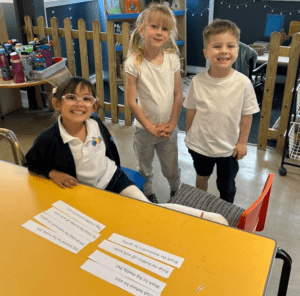
We also played Verb Charades, acting out actions while friends guessed the verb. It was a fun way to learn and helped us remember how verbs work.
Help at Home
- Verb Hunt: Spot action words in daily life. Are they past or present?
- Story Time: Change story verbs to past or present.
- Charades: Act out verbs and guess the action.
Sunshine and Rugby!
This week in PE, Year One had a fantastic time outside in the sunshine, practising their rugby skills! The children have been working on their dodging, throwing and catching. All skills that will help them in many different sports!
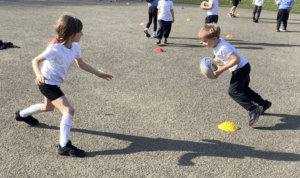
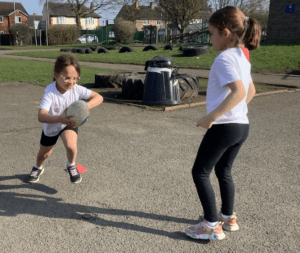


They also focused on how to hold the ball correctly and the importance of a wide stance when trying to block an opponent. Everyone showed great determination and teamwork—well done Year One!
